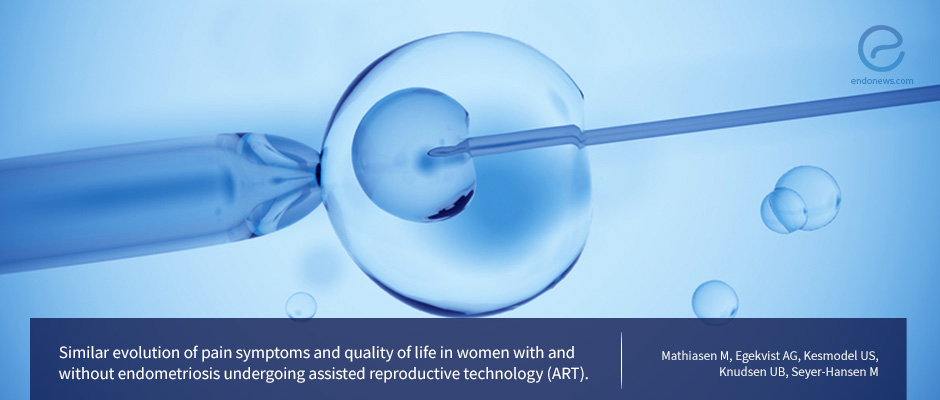Assistive Reproduction a Suitable Option for the Treatment of Endometriosis-Associated Infertility
Feb 27, 2019
Assisted reproduction does not worsen quality of life.
Key Points
Highlights:
- Assisted reproduction causes a slight increase in general pelvic pain both in women with endometriosis and those without the disease.
- Assisted reproduction does not lead to a reduced quality of life.
Importance:
- Assisted reproduction is a suitable option for the treatment of infertility in women with endometriosis.
What's done here:
- Researchers used the Endometriosis Health Profile (EHP-30) and a numerical rating scale (NRS) to assess the quality of life and pain symptoms.
Key results:
- Women with endometriosis experienced a small increase in their quality of life regardless of whether or not they were undergoing assisted reproduction.
- Women without endometriosis undergoing assisted reproduction experienced a decrease in their quality of life.
- Assisted reproduction was associated with a worsening in pelvic pain but this was not greater among women with endometriosis compared to those without endometriosis.
Limitations:
- The women with endometriosis who were included in the study had different disease stage, which caused a great variation in questionnaire parameters.
- Women with endometriosis not undergoing assisted reproduction were recruited from a tertiary referral center and therefore could have had particularly severe endometriosis, which could alter the results.
- Women who did not have endometriosis were undergoing assisted reproduction for a range of different reasons including the infertility of the male partner and therefore their quality of life might have been affected differently.
- It cannot be ruled out that some women without endometriosis included in the study actually had subliminal endometriosis.
- Women included in the study were only followed up for four weeks, which is too short a period of time to detect symptoms evolving slowly and persisting over time.
- Baseline data were collected after ovarian stimulation had already begun so women’s frame of mind was already different from usual potentially affecting the results.
Lay Summary
Assistive reproductive techniques do not lead to a worsening in quality of life and only cause a slight worsening of pelvic pain, according to a study published in the scientific journal Acta Obstetricia et Gynecologica Scandinavica. This is the case regardless of whether or not a woman has endometriosis.
Assisted reproduction, therefore, seems to be a suitable option for the treatment of infertility in women with endometriosis.
Endometriosis affects around 10 percent of all women of reproductive age. The disease is characterized by tissue resembling the one that normally lines the uterus, to grow outside of the uterus and form lesions. These lesions respond to estrogen in the same way as the normal lining of the uterus, swelling and shedding with the menstrual cycle if no fertilization occurs. However, because there is no safe exit route for the extra-uterine growths to leave the body, they cause inflammation and lead to chronic pelvic pain and in severe cases, infertility.
Around one-fourth of all women with endometriosis require assisted reproduction to conceive. During this process, the controlled stimulation of the ovaries to produce eggs causes high levels of estrogen, which can worsen the symptoms of the disease.
A team of researchers in Denmark conducted a study in 154 women In order to assess whether controlled ovarian stimulation during assisted reproduction reduces women’s quality of life and increases pelvic pain. Of the 154 women, 102 had endometriosis and 52 of them underwent assisted reproduction. The remaining 52 women also underwent assisted reproduction but did not have endometriosis.
The researchers used questionnaires to assess women’s pain and quality of life.
They found that women with endometriosis did not experience a worsening in pain and quality of life during assisted reproduction compared to women without the disease and women with endometriosis not undergoing assisted reproduction.
They also found that both women with and without endometriosis undergoing assisted reproduction experienced a slight increase in pelvic pain. But this increase was no greater in women with endometriosis compared to women without endometriosis.
The researcher concluded that assisted reproduction did not worsen quality of life and only caused a slight increase in pelvic pain regardless of whether or not a woman has endometriosis.
Research Source: https://www.ncbi.nlm.nih.gov/pubmed/30238446
Assisted reproduction pelvic pain quality of life

